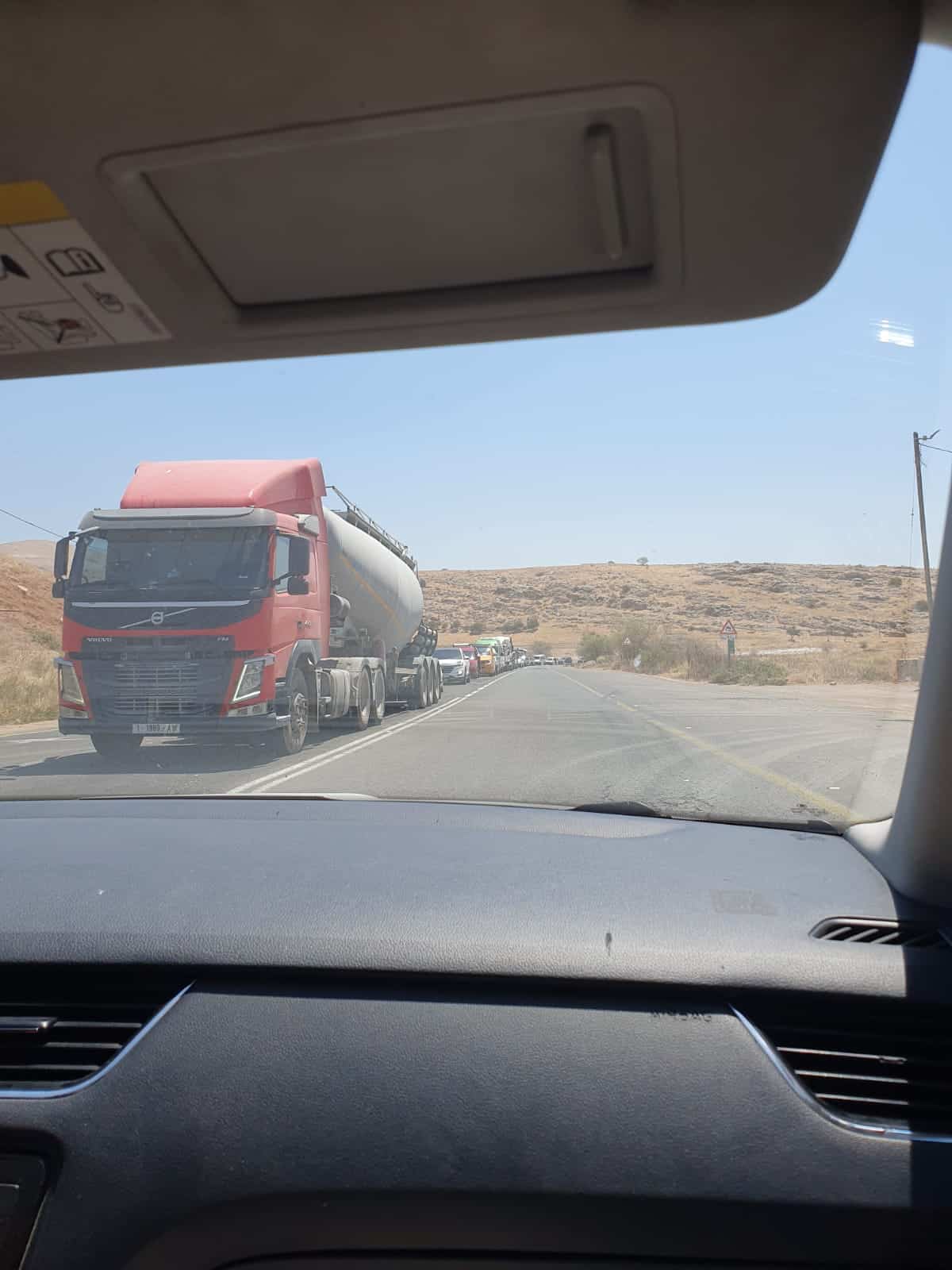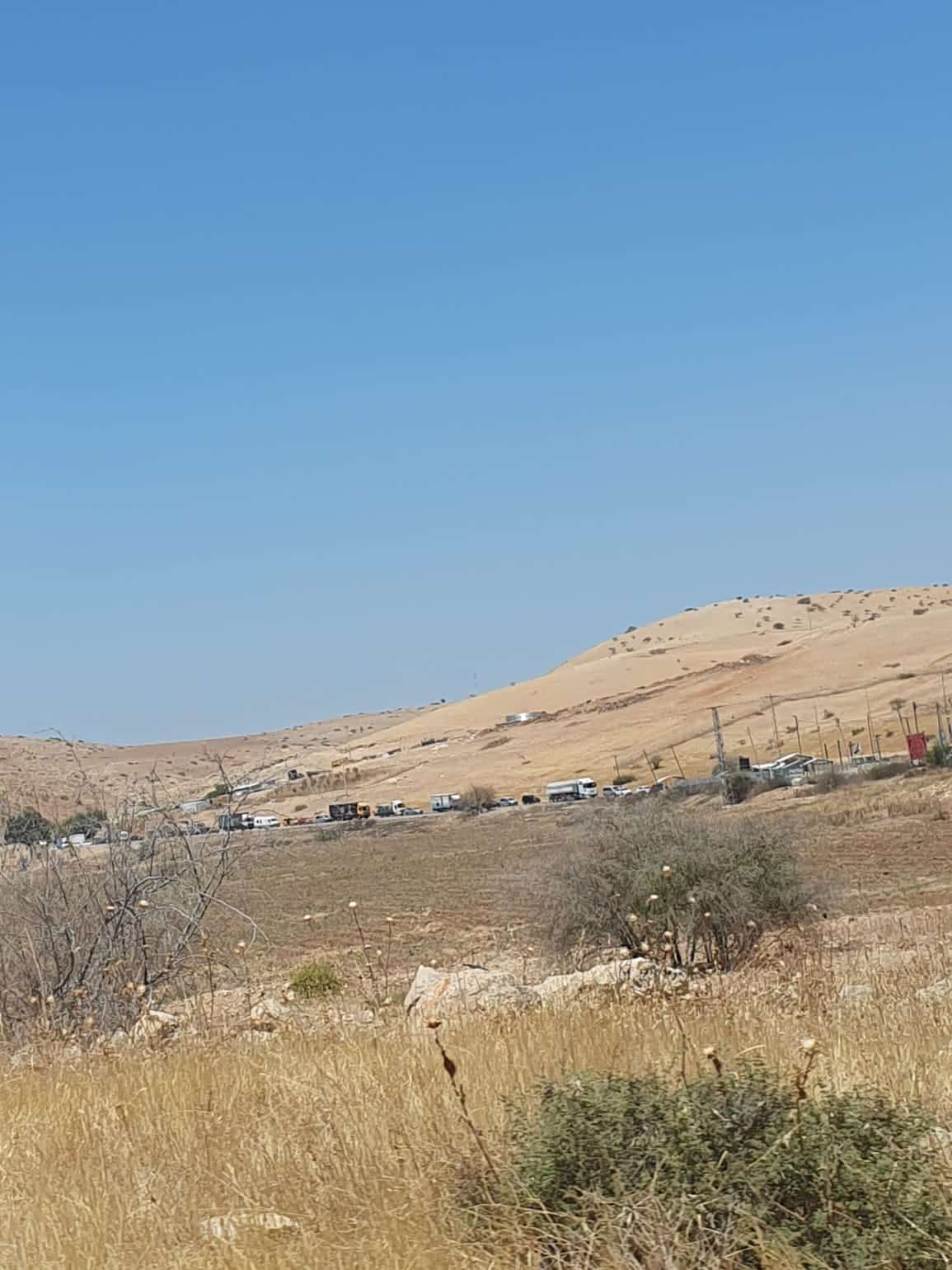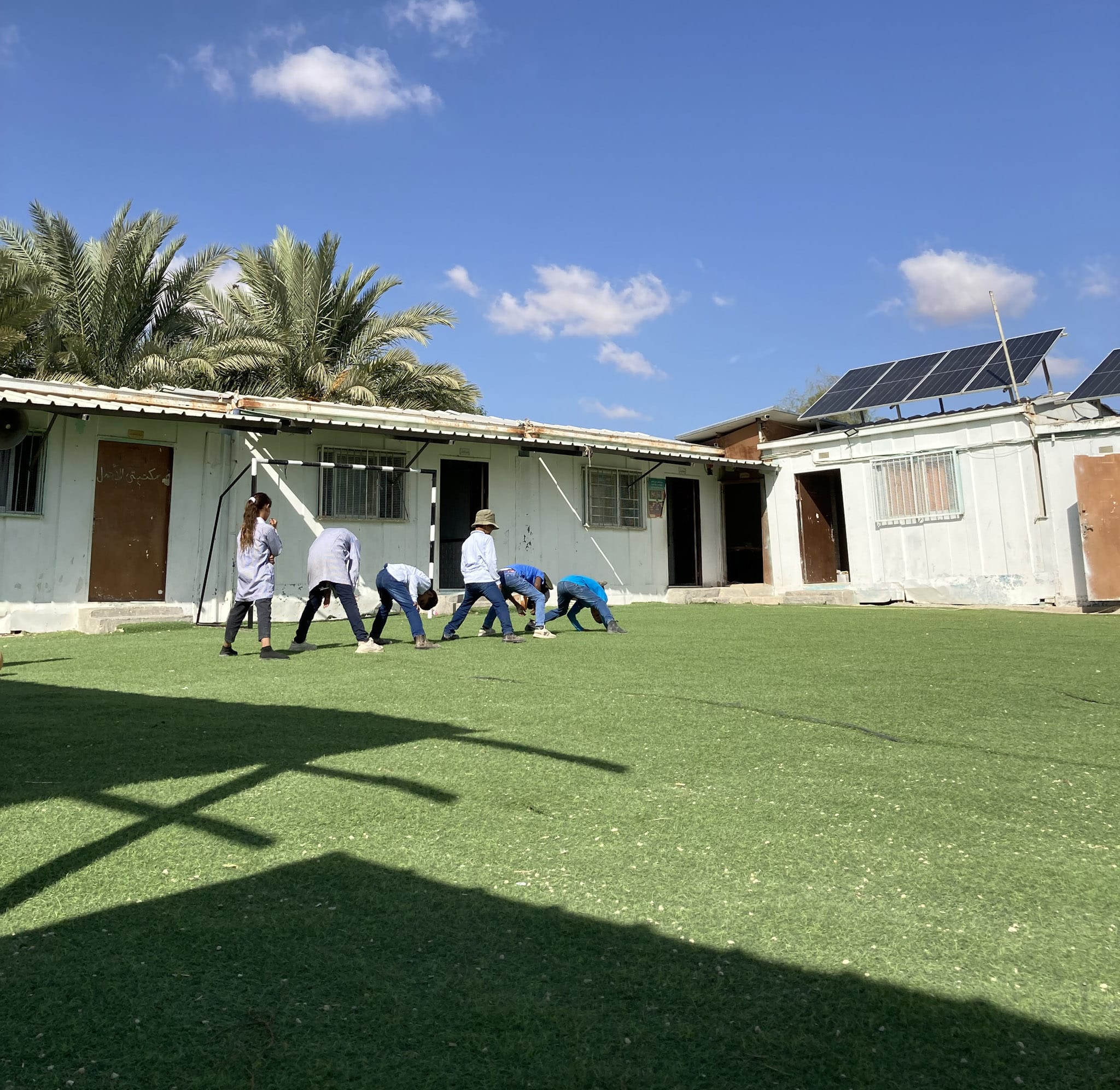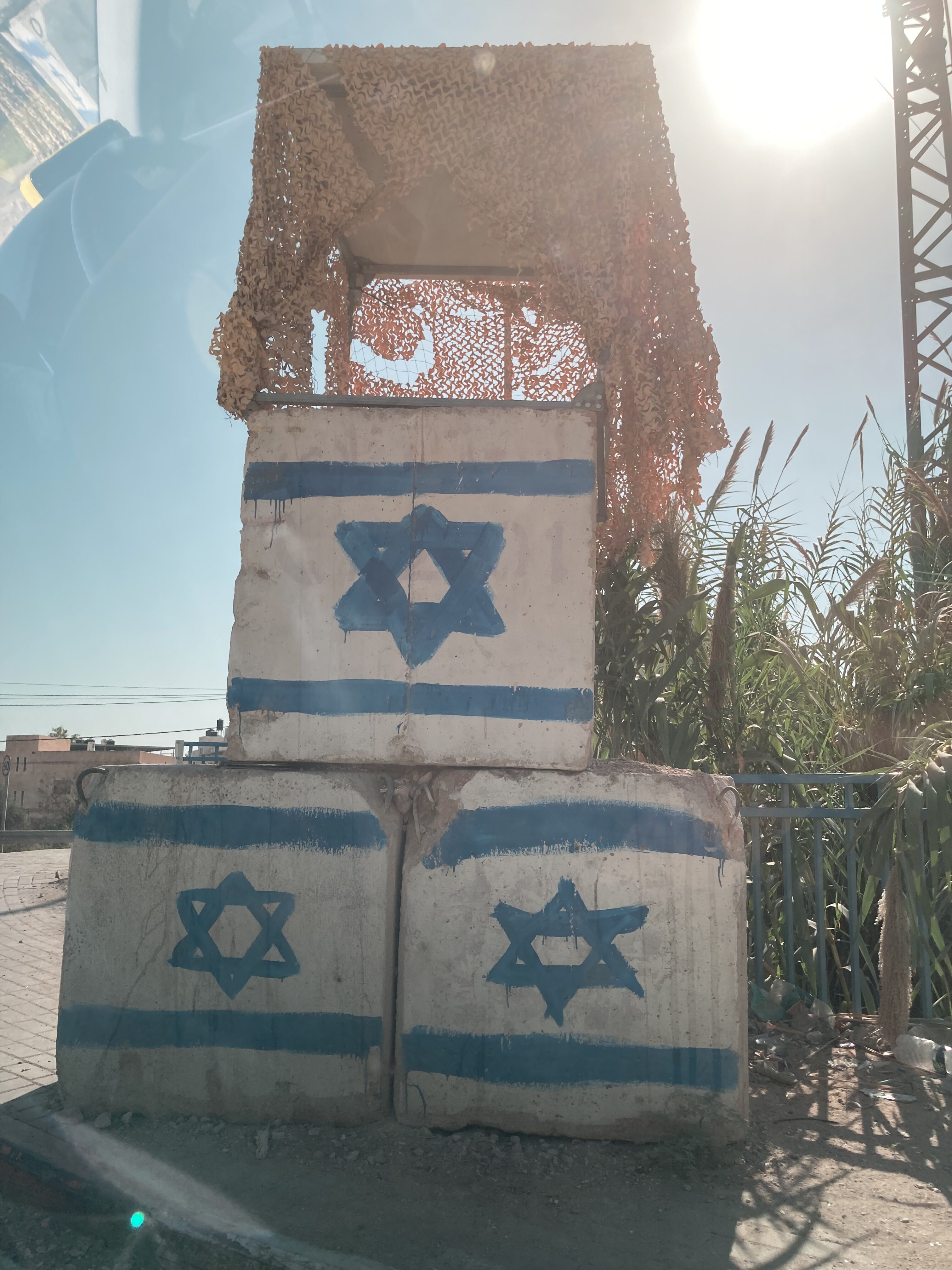As some people might talk about the weather, so Palestinians chat about checkpoints. They warn each other if they see closures or long queues and plan alternative routes. Military checkpoints in the occupied Palestinian West Bank have been stopping people from reaching their jobs, schools, and hospitals for many years. Still, since the violent escalations in Gaza began in October 2023, things have worsened. An 18-year-old schoolboy told us at his home in Al Farisiya;
‘I hate checkpoints, they’re the worst thing in my life right now.’
At checkpoints, Israeli armed soldiers direct traffic and stop cars one at a time. Passengers must show their identity documents, which can take an hour or more for each vehicle to pass. A grandmother and farmer from Hammamet Al Maleh in the West Bank told us;
‘Tayasir checkpoint is the worst in the Jordan Valley. Each checkpoint has different rules. Sometimes one soldier says come, and one says stop, so you don’t know what to do, and they could shoot you.’
Checkpoints rarely have toilet facilities, which is especially hard for older adults, women, and children queuing for hours in hot cars. Commercial traffic is delayed and the Palestinian economy is profoundly impacted. A local businessman told us;
‘The Al Jiftlik area is just a big prison. Checkpoints stop us doing anything.‘
Bardala village council leader commented that;
‘a four or five-hour trip to avoid a checkpoint is better than waiting. Teenage soldiers at checkpoints swear at old men and laugh at them. We Palestinians respect old people; it’s a red line for us.’
A shepherd from Ein al Hilwa told us last month he had seen soldiers at checkpoints make people bark like dogs if they wanted to get through. He also saw soldiers force a man out of his car with his wife and children inside. The soldier got into the car and drove around very fast in circles while they were screaming. Then, the soldier let them pass through. He added;
‘Tayasir checkpoint is very dangerous now.’

These signs erected by the Israeli authorities can be found near to many Palestinian areas across the occupied West Bank
A farmer from Bardala described how checkpoints had forced him to change his work routine. He grows fruit and vegetables in the Jordan Valley and drives through the Tayasir checkpoint to sell his produce in Tubas town market. The checkpoint delays since October 2023 often made him arrive so late that he missed the market. If he had reached the market, his fresh fruit and vegetables would have often wilted after hours in the lorry, and he could not charge the usual prices for them. He now drives to Tubas the day before the market and sleeps there instead of at home with his wife and children. His produce is less fresh on market days because of the overnight stay, and he receives less money. He said;
‘We are sleeping and dreaming about checkpoints.’

Cars queue at Hamra checkpoint

Cars queue at Hamra checkpoint
In September, we saw schoolchildren in Jericho town excitedly choosing bright water bottles and pencil cases for the new school term. But at Al Jiftlik school, classes did not happen as the pupils had hoped. Their teachers living in Nablus, Jenin, and Tubas had to travel through the Tayasir checkpoint to reach their school. The checkpoint was closed for two days, and the children were sent home without lessons. Parents living in Hammamet Al Maleh told us their children often missed classes because teachers passing checkpoints were so late to school. A retired teacher told us;
‘Education is the most important thing to us… you see more things in life if you have an education.’

Pupils in the playground at a primary school in the Jordan Valley
As well as disrupting access to livelihoods and education, checkpoints stop Palestinians from getting urgent medical attention. Last month, an elderly resident of Hammamet al Maleh needed a doctor for severe eye pain. Hamra checkpoint was blocked by traffic, so her husband used a bumpy agricultural road to approach the clinic. On the way, an army jeep stopped them for over two hours and made them go back to Hamra checkpoint. A mother of six from Fasayil Al Fauq told us;
‘Hospitals and health are a big problem here. I delivered a neighbour’s baby at my home recently as there were no health workers available.’
She added that her husband had died in 2022 after they could not get emergency services to visit. Doctors told her he could have survived if they had seen him more quickly. She now works long, hot hours on a date farm to support her young family.
Palestine’s Jordan Valley in the occupied West Bank is wide and flat with fertile fields, and it runs north-south along the west side of the Jordan River from the Sea of Galilee to the Dead Sea. Palestinians mostly live in small villages or Bedouin communities. The central city is Jericho to the south. Schools, hospitals, and workplaces are often in the towns outside the Jordan Valley, so good transport is vital for everybody.

Boulders preventing Palestinian movement
There are three kinds of checkpoint in Palestine’s occupied West Bank.
-
permanent checkpoints like at Tayasir and Hamra which operate day and night.
-
temporary checkpoints look like concrete booths at the roadside and if they are open soldiers stand in them, stop traffic going in any direction and inspect ID cards or search cars. Whole cities can be closed down at short notice this way. Around Jericho temporary checkpoints are often manned in the evenings.
-
flying checkpoints can be set up anywhere at any time. Soldiers arrive in jeeps and put up a barrier and monitor all movements on the road.
The Israeli Defense Forces state that ‘checkpoints respect human rights while keeping Israel safe from terrorism’ adding that they ‘operate during times of heightened security to prevent terrorists from carrying out their plans to harm civilians.’ Conversely, Israeli human rights human rights organisation, B’Tselem state that ‘restricting movement is a major tool Israel uses to enforce its apartheid regime and control the Palestinian population.’
‘A Palestinian leaving home in the morning cannot know whether he or she is going to make it work – on time or at all – or to keep a medical appointment, visit family or catch a movie. She might make it, or she might be delayed at a checkpoint for hours, detained and humiliated by soldiers. She may have to turn around and go back the way she came. She may get arrested.’
In July 2024, the world’s highest court, the International Court of Justice (ICJ), advised that Israel’s occupation of all Palestinian territory is illegal and must end. The advisory opinion explicitly named the checkpoint regime stating that Israel’s legislation and measures violate the international prohibition on racial segregation. Please find our urgent actions below and join us in calling on elected representatives and faith leaders to honour the findings of the court.
Take action!
-
Sign and share our urgent action on the ICJ’s Palestine ruling! In the UK? Sign here. In Ireland? Sign here.
-
Israel has passed a law, which will make it extremely difficult for the Palestinian refugee agency UNRWA to deliver its life-saving services at a time of immense need. Sign and share our urgent action to protect UNRWA. In the UK? Sign here. In Ireland? Sign here.
-
Israel’s expanding military campaign is having catastrophic consequences for people in Palestine and Lebanon. Donate to the Disaster Emergency Committee (DEC) humanitarian appeal here. Can’t donate? Can you share with your friends and family?
What does international law say?

